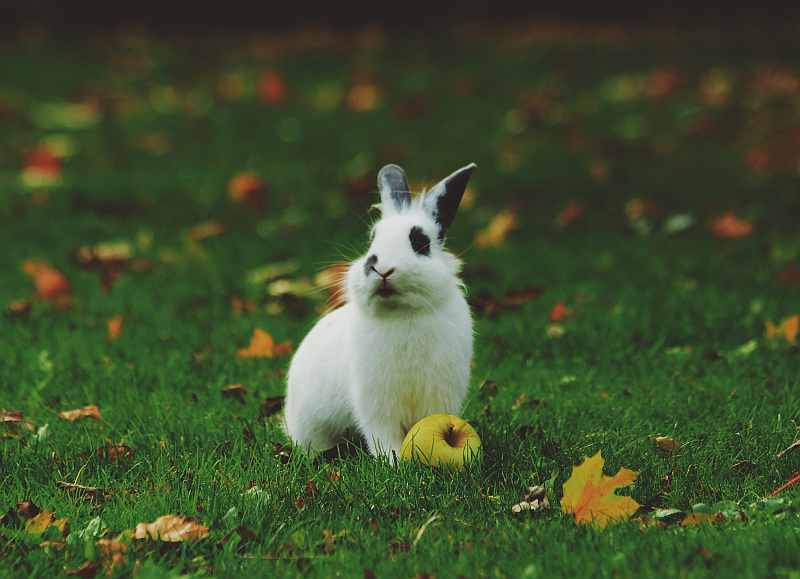You’ve likely heard ‘an apple a day keeps the doctor away,’ but when it comes to your furry friend, it’s not that simple. You’re responsible for ensuring your rabbit’s diet is nutritious and safe.
This guide will help you navigate rabbit nutrition’s do’s and don’ts, highlighting fruits that are safe for your bunny, how often they should be offered, and which fruits to avoid.
Dive in to discover what fruits can rabbits eat and keep them hopping happily and healthily.
Understanding Rabbit Nutrition Basics
Before delving into the variety of fruits your rabbit can safely enjoy, it’s essential to grasp the fundamentals of rabbit nutrition. Rabbit digestive anatomy is specialized for processing a fiber-rich diet, primarily composed of hay, grass, and leafy greens. This fibrous food is crucial because it provides the necessary wear on their continuously growing teeth and stimulates gut motility, ensuring proper digestion.
A rabbit’s digestive system is highly efficient at fermenting fibrous materials in the hindgut, which is why a diet low in fiber can lead to serious health issues. To support this delicate system, it’s important that fruits, high in sugar, are offered sparingly, as treats, and not as a staple of their diet.
Safe Fruits for Rabbit Consumption
You’ll find that a rabbit’s treat menu can safely include apple slices, blueberries, and melon chunks, among other fruit options. When introducing fruits into your rabbit’s diet, consider the fruit variety importance to ensure a balance of nutrients:
- Apple Slices (without seeds)
- High in fiber, aiding in digestion
- Provide vitamins A and C
- Blueberries
- Rich in antioxidants
- Small size makes them a perfect occasional treat
- Melon Chunks
- Hydrating and sweet
- Contain essential vitamins
Dental health considerations are paramount; crunchy fruits can help maintain healthy teeth. However, due to sugar content, it’s crucial to offer these treats in moderation—consider them a special indulgence rather than a staple. Keep portions small and infrequent to avoid health issues.
Portion Sizes and Frequency Guidelines
You must feed your rabbit fruits in moderation since their digestive systems are sensitive to sugar and excessive fiber. A safe guideline is to limit fruit to a maximum of two tablespoons per five pounds of body weight per day.
It’s crucial to adhere to these serving sizes to prevent health issues such as gastrointestinal upset and obesity.
Moderation Is Key
While many fruits are safe for your rabbit, offering them in small, controlled portions no more than twice a week is crucial. Introducing a fruit variety can provide nutritional benefits but also raise the risk of allergic reactions. Here’s how to proceed with caution:
- Portion Control
- For small rabbits: 1 teaspoon per 2 pounds of body weight
- For larger breeds: 1 tablespoon per 5 pounds of body weight
- Frequency
- Limit fruit to twice a week
- Provide a rotation to avoid excessive sugar intake
- Observation
- Monitor for digestive upset
- Watch for signs of allergic reactions, such as swelling or difficulty breathing
Daily Fruit Limits
It is essential to limit your rabbit’s fruit intake to a few small pieces each day and adhere strictly to the recommended portion sizes and frequency guidelines. Typically, this means no more than 1 to 2 tablespoons of fruit per 5 pounds of body weight.
Offering fruit too frequently can lead to health issues, including obesity and digestive problems. Additionally, be mindful of fruit allergies, which, although rare in rabbits, can occur. Always introduce new fruits gradually and observe your rabbit for any adverse reactions.
Considering the seasonal availability of fruits can also help provide a varied diet and ensure that your rabbit isn’t overexposed to any single type of fruit, which could increase the risk of developing sensitivities or gastrointestinal upset.
Ideal Serving Sizes
Considering your rabbit’s size and weight, aim for no more than 1 to 2 tablespoons of fruit per 5 pounds of body weight per day to maintain a balanced diet. Here’s how you can ensure this:
- Fruit preparation:
- Wash fruits thoroughly to remove pesticides.
- Cut into small, manageable pieces to prevent choking.
- Introduce new fruits slowly to monitor for any allergic reactions.
When introducing fruits, observe your rabbit for any signs of discomfort or unusual behavior, which may indicate an allergic reaction. It’s crucial to strike a balance, as too much fruit can lead to health issues such as obesity and digestive problems.
Stick to these guidelines and always prioritize hay, fresh water, and leafy greens as the main components of your rabbit’s diet.
High-Sugar Fruits to Limit
You’ll need to restrict the quantity of high-sugar fruits, such as bananas and grapes, that your rabbit consumes. While offering a variety of fruits can enrich your rabbit’s diet and provide essential nutrients, it’s crucial to consider their sugar content. High-sugar fruits can lead to weight gain and may adversely affect your rabbit’s dental health.
Rabbits have continuously growing teeth, and a diet high in sugar can cause tooth decay and other dental problems. It’s best to treat these fruits as occasional treats rather than regular diet staples. When you do offer them, do so in moderation to prevent potential health issues.
Fruits to Avoid Completely
While you may want to treat your rabbit to a varied diet, some fruits must be avoided because they are toxic to rabbits.
For instance, the seeds and pits of fruits like apples and cherries contain cyanide, which harms your furry friend.
Additionally, fruits with high sugar content can lead to obesity and digestive issues, so it’s crucial to recognize which ones to exclude from their diet.
Toxic Fruit Types
In discussing rabbit-friendly fruits, knowing which fruits are toxic is crucial and should never be part of your rabbit’s diet. While fruit preparation for rabbits often involves removing seeds and pits, some fruits are inherently unsafe and no form of preparation makes them suitable. Instead of risking your furry friend’s health, opt for alternative treats that are proven to be safe.
- Toxic Fruit Types:
- Avocado: Contains persin, harmful to rabbits.
- Cherries: Pits and plants parts contain cyanide.
- Rhubarb: Oxalic acid in leaves and stems is poisonous.
Sugar Content Concerns
Considering which fruits to include in your rabbit’s diet, it’s important to note that some should be avoided due to their high sugar content. Excess sugar can lead to obesity and other health issues in rabbits, such as gastrointestinal problems. Specifically, fruit ripeness can significantly increase sugar concentration, so it’s crucial to recognize which fruits are too ripe for your rabbit’s consumption.
Be cautious with your rabbit’s dental health. High sugar content can contribute to dental disease, a common issue in rabbits. They cannot vomit, so the sugars sit in their stomach, potentially causing harm. Therefore, fruits like bananas, grapes, and cherries are best avoided or offered in minimal amounts on rare occasions to prevent health complications.
Offering Fruits as Treats Responsibly
You should consider fruit a special indulgence for your rabbit, not a daily staple. Fruits, while a delightful treat, contain sugar that can disrupt your rabbit’s digestive system and lead to obesity if overfed. It’s essential to maintain a balanced diet to ensure optimal rabbit hydration and overall health.
- Frequency and Portion Size
- Offer fruit in small amounts
- Limit to 1-2 times per week
- A teaspoon-sized portion per 2 pounds of body weight is sufficient
- Treat Alternatives
- Fresh leafy greens for daily treats
- Hay cubes or hay-based treats for chewing
- Various herbs as low-calorie options
- Hydration
- Fresh water should always be available
- Vegetables with high water content can support hydration
- Monitor for regular water intake daily
Frequently Asked Questions
How Do I Introduce New Fruits to My Rabbit’s Diet Without Causing Digestive Upset?
Introduce new fruits gradually to your rabbit’s diet, ensuring portion control to prevent digestive upset. Gradually increase the amount over time, monitoring your pet’s health and tolerance closely.
Can Rabbits Have Dried Fruits, or Should They Only Eat Fresh Varieties?
You should avoid giving rabbits dried fruits due to their high sugar content and potential risks, such as dental problems and obesity. Instead, stick to fresh varieties in moderation for your bunny’s health.
Are There Any Benefits to Feeding My Rabbit Fruits With Seeds or Should Seeds Always Be Removed?
You should always remove seeds before feeding your rabbit fruits, as they can disrupt digestion and nutritional balance. Seeds often contain harmful substances that are not safe for your rabbit’s health.
How Can I Tell if My Rabbit Is Allergic or Has a Negative Reaction to a Specific Fruit?
Watch your rabbit like a hawk for fruit allergy signs. You’ll notice itching, swelling, or digestive upset. Monitor reactions meticulously after introducing new fruits to ensure your furry friend’s health isn’t compromised.
Is It Safe to Give My Rabbit Fruit Peels or Should They Only Be Given the Flesh of the Fruit?
You should only give your rabbit fruit peels if they’re non-toxic and clean. Peel nutrients can be beneficial, but ensure they’re safe and pesticide-free to avoid any health issues for your pet.
Conclusion
You’re the guardian of a fluffy little eating machine. But hold your horses before turning their diet into a fruit basket bonanza! Offer safe fruits like blueberries and apples in mouse-sized portions, sparingly. Think of them as rabbit gold, not everyday hay.
Dodge the sugar-laden fruit grenades and ban the forbidden ones entirely. Be the wise gatekeeper of treats, ensuring your bunny hops towards health, not into a sugary pitfall.
Remember, moderation is key in the rabbit fruitopia!

